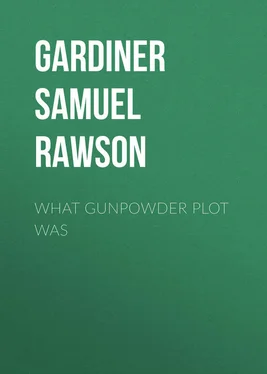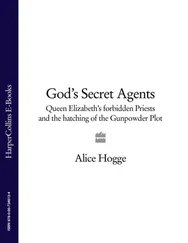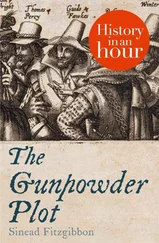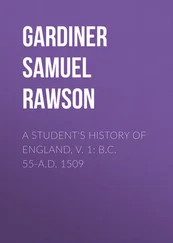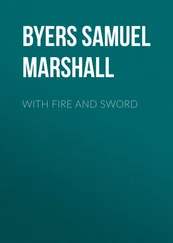Samuel Gardiner - What Gunpowder Plot Was
Здесь есть возможность читать онлайн «Samuel Gardiner - What Gunpowder Plot Was» — ознакомительный отрывок электронной книги совершенно бесплатно, а после прочтения отрывка купить полную версию. В некоторых случаях можно слушать аудио, скачать через торрент в формате fb2 и присутствует краткое содержание. Жанр: foreign_antique, foreign_prose, на английском языке. Описание произведения, (предисловие) а так же отзывы посетителей доступны на портале библиотеки ЛибКат.
- Название:What Gunpowder Plot Was
- Автор:
- Жанр:
- Год:неизвестен
- ISBN:нет данных
- Рейтинг книги:3 / 5. Голосов: 1
-
Избранное:Добавить в избранное
- Отзывы:
-
Ваша оценка:
- 60
- 1
- 2
- 3
- 4
- 5
What Gunpowder Plot Was: краткое содержание, описание и аннотация
Предлагаем к чтению аннотацию, описание, краткое содержание или предисловие (зависит от того, что написал сам автор книги «What Gunpowder Plot Was»). Если вы не нашли необходимую информацию о книге — напишите в комментариях, мы постараемся отыскать её.
What Gunpowder Plot Was — читать онлайн ознакомительный отрывок
Ниже представлен текст книги, разбитый по страницам. Система сохранения места последней прочитанной страницы, позволяет с удобством читать онлайн бесплатно книгу «What Gunpowder Plot Was», без необходимости каждый раз заново искать на чём Вы остановились. Поставьте закладку, и сможете в любой момент перейти на страницу, на которой закончили чтение.
Интервал:
Закладка:
On the same day, the 7th, something was definitely heard of the proceedings of the other plotters, who had either gathered at Dunchurch for the hunting-match, or had fled from London to join them, and a proclamation was issued for the arrest of Percy, Catesby, Rokewood, Thomas Winter, Edward 35 35 Properly ‘John.’
Grant, John and Christopher Wright, and Catesby’s servant, Robert Ashfield. They were charged with assembling in troops in the counties of Warwick and Worcester, breaking into stables and seizing horses. 36 36 S. P. Dom. xvi. 20.
Fawkes, too, was on that day subjected to a fourth examination. 37 37 G. P. B. No. 37. Witnessed by Northampton and Popham only.
Not very much that was new was extracted from him. He acknowledged that his real name was Guy Fawkes, that – which he had denied before – he had received the Sacrament not to discover any of the conspirators, and also that there had been at first five persons privy to the plot, and afterwards five or six more ‘were generally acquainted that an action was to be performed for the Catholic cause, and saith that he doth not know that they were acquainted with the whole conspiracy.’ Being asked whether Catesby, the two Wrights, Winter, or Tresham were privy, he refused to accuse any one.
The increase of the information received by the Government left its trace on Salisbury’s correspondence. Whether the letter to Parry, from which a quotation has already been given, was sent away on the 6th, is unknown; but it was copied and completed, with sundry alterations, for Cornwallis and Edmondes, the ambassadors at Madrid and Brussels, and signed by Salisbury on the 7th, though it was kept back and sent off with two postscripts on the 9th, and it is likely enough that the letter to Parry was treated in the same way. One of the alterations concerns Fawkes’s admission that he had taken the Sacrament as well as an oath to keep the secret. What is of greater significance is, that there is absolutely no mention of a mine in the letter. If it had really been written on the 9th, this silence would have gone far to justify Father Gerard’s suspicions, as the existence of the mine was certainly known to the Government at that date. On the 7th the Government knew nothing of it. 38 38 The letter to Cornwallis, printed in Winwood’s Memorials , ii. 170, is dated Nov. 9, as it is in Cott. MSS. Vesp. cix. fol. 240, from which it is printed. That volume, however, is merely a letter book. The letter to Edmondes, on the other hand, in the Stowe MSS. 168, fol. 213, is the original, with Salisbury’s autograph signature, and its date has clearly been altered from 7 to 9.
That Fawkes had already been threatened with torture is known, 39 39 Waad to Salisbury, Nov. 7. – Hatfield MSS.
and it may easily be imagined that the threats had been redoubled after this last unsatisfactory acknowledgment. On the morning of the 8th, however, Waad, who was employed to worm out his secrets, reported that little was to be expected. “I find this fellow,” he wrote, “who this day is in a most stubborn and perverse humour, as dogged as if he were possessed. Yesternight I had persuaded him to set down a clear narration of all his wicked plots from the first entering to the same, to the end they pretended, with the discourses and projects that were thought upon amongst them, which he undertook [to do] and craved time this night to bethink him the better; but this morning he hath changed his mind and is [so] sullen and obstinate as there is no dealing with him.” 40 40 Waad to Salisbury, Nov. 8. — G. P. B. No. 48 B.
The sight of the examiners, together with the sight of the rack, 41 41 In ‘The King’s Book’ it is stated that Fawkes was shown the rack, but never racked. Probably the torture used on the 9th was that of the manacles, or hanging up by the wrists or thumbs.
changed Fawkes’s mind to some extent. He was resolved that nothing but actual torture should wring from him the names of his fellow plotters, who so far as was known in London were still at large. 42 42 The principal ones were either killed or taken at Holbeche on that very day.
He prepared himself, however, to reveal the secrets of the plot so far as was consistent with the concealment of the names of those concerned in it. His fifth examination on the 8th, the last before the one taken under torture on the 9th, gives to the inquirer into the reality of the plot all that he wants to know.
“He confesseth,” so the tale begins, “that a practice was first broken unto him against his Majesty for the Catholic cause, and not invented or propounded by himself, and this was first propounded unto him about Easter last was twelvemonth, beyond the seas in the Low Countries, by an English layman, 43 43 Thomas Winter.
and that Englishman came over with him in his company, into England, and they two and three more 44 44 Catesby, Percy, and John Wright.
were the first five mentioned in the former examination. And they five resolving to do somewhat for the Catholic cause (a vow being first taken by all of them for secrecy), one of the other three 45 45 I.e. Catesby. In a copy forwarded to Edmondes by Salisbury (Stowe MSS. 168, fol. 223) the copyist had originally written ‘three or four more,’ which is altered to ‘three.’
propounded to perform it with powder, and resolved that the place should be (where this action should be performed and justice done) in or near the place of the sitting of the Parliament, wherein Religion had been unjustly suppressed. This being resolved, the manner of it was as followeth: —
“First they hired the house at Westminster, of one Ferres, and having his house they sought then 46 46 ‘Then,’ omitted in the Stowe copy.
to make a mine under the Upper House of Parliament, and they began to make the mine in or about the 11 of December, and they five first entered into the works, and soone after took an other 47 47 Christopher Wright.
to 48 48 ‘Unto,’ in the Stowe copy.
them, having first sworn him and taken the sacrament for secrecy; and when they came to the wall (that was about three yards thick) and found it a matter of great difficulty, they took to them an other in like manner, with oath and sacrament as aforesaid; 49 49 Robert Winter. The question whether Keyes worked at this time will be discussed later on.
all which seven were gentlemen of name and blood, and not any 50 50 ‘Any man,’ in the Stowe copy.
was employed in or about this action (no, not so much as in digging and mining) that was not a gentleman. And having wrought to the wall before Christmas, they ceased until after the holidays, and the day before Christmas (having a mass of earth that came out of the mine), they carried it into the garden of the said house, and after Christmas they wrought the wall till Candlemas, and wrought the wall half through; and saith that all the time while the other 51 51 ‘Others,’ in the Stowe copy.
wrought, he stood as sentinel, to descry any man that came near, and when any man came near to the place upon warning given by him, they ceased until they had notice to proceed from him, and sayeth that they seven all lay in the house, and had shot and powder, and they all resolved to die in that place, before they yielded or were taken.
“And, as they were working, they heard a rushing in the cellar, which grew by one 52 52 ‘One’ is inserted above the line.
Bright’s selling of his coals, 53 53 This is an obvious mistake, as the widow Skinner was not at this time married to Bright, but one just as likely to be made by Fawkes himself as by his examiners.
whereupon this examinant, fearing they had been discovered, went into the cellar, and viewed the cellar 54 54 ‘Viewed it,’ in the Stowe copy.
and perceiving the commodity thereof for their purpose, and understanding how it would be letten, 55 55 ‘Taken,’ in Stowe copy.
his master, Mr. Percy, hired the cellar for a year for 4 l. rent; and confesseth that after Christmas twenty barrels of powder were brought by themselves to a house, which they had on the Bankside in hampers, and from that house removed 56 56 ‘Thence,’ in Stowe copy.
the powder to the said house near the Upper House of Parliament; and presently, upon hiring the cellar they themselves removed the powder into the cellar, and covered the same with fagots which they had before laid into the cellar.
Интервал:
Закладка:
Похожие книги на «What Gunpowder Plot Was»
Представляем Вашему вниманию похожие книги на «What Gunpowder Plot Was» списком для выбора. Мы отобрали схожую по названию и смыслу литературу в надежде предоставить читателям больше вариантов отыскать новые, интересные, ещё непрочитанные произведения.
Обсуждение, отзывы о книге «What Gunpowder Plot Was» и просто собственные мнения читателей. Оставьте ваши комментарии, напишите, что Вы думаете о произведении, его смысле или главных героях. Укажите что конкретно понравилось, а что нет, и почему Вы так считаете.
